Listen to New York Rangers rookie Filip Chytil, and the 19-year-old forward feels surrounded by confidence and support from a coaching staff determined to help him through a formidable adjustment period and a steep learning curve for a teenager playing in the NHL.
“I did feel different,” Chytil said after returning from a two-game benching and delivering a key assist on Pavel Buchnevich’s tying goal in a 3-2 shootout loss to the Washington Capitals. “(The coaching staff and I) had a lot of talks. The season is so long. I never played so many games. When I was out, I worked hard in practice and when I watched the games, I tried to focus on the details of what the coaches want from us. I tried to do that in this game.”
David Quinn was hired to coach with teaching youngsters as his top mandate. Though the results of his work vary from player to player, his efforts with Chytil, highly talented but uncertain of himself, along with defenseman Tony DeAngelo, are arguably his most impressive to date.
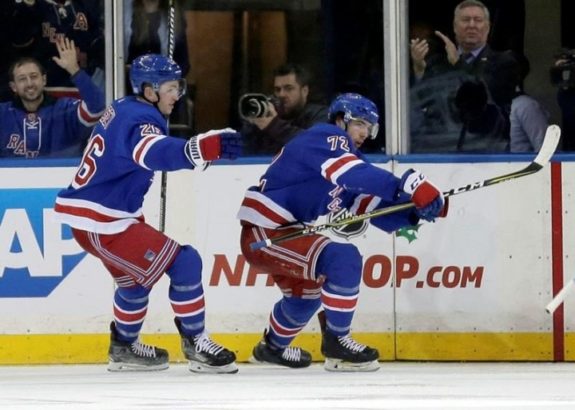
Chytil, of course, hardly resembles the elite scorer the Rangers hope he can become at this point. Now playing on the wing instead of his natural center spot – to which the club sees him eventually transitioning – he arrived on Broadway last season with tantalizing offensive skills and little else.
The 21st-overall pick in the 2017 NHL Draft, trying to acclimate to the North American game with a limited grasp of English working against him, made the team with a strong training camp but proved unready for the NHL. He played just nine games with the Blueshirts while spending most of his season with the Hartford Wolf Pack of the AHL.
The Czech Republic native was better prepared for the league this season, yet no quantum leap in consistency or production has occurred. Yet, it’s Quinn’s patience and committed guidance that has helped Chytil shine.
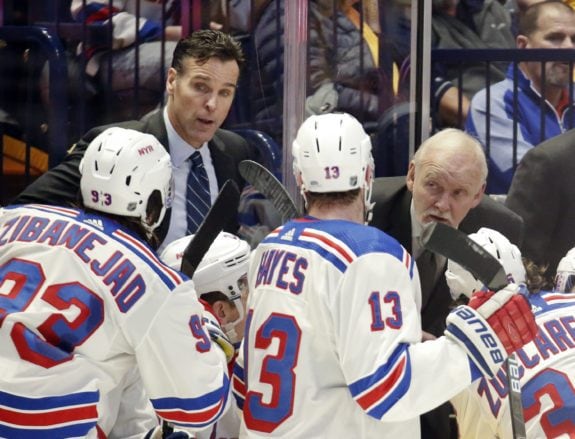
“It seems in the week he’s been out, it’s been a different Filip Chytil,” Quinn said Sunday. “He’s gone to another level with his work ethic and demeanor, and I thought this would be a good game to get him in. It wasn’t the (original) plan to bring him back for this game, I knew he’d be out for more than one but didn’t know whether it would be two, three or four. What he was doing on those days determined how long it would be.
I certainly liked his approach to this game.”
Quinn Applying Positivity, Patience With Chytil
Quinn has taken pains to communicate that he doesn’t view healthy scratches as punishments – rather, they are opportunities for reflection and refocusing. The coach’s message on working hard has been uniformly applied throughout the roster. He lets young players know that he’s simply trying to get them to redefine their perception of hard work, the type of work needed to thrive in the NHL.
Most importantly, Quinn has given Chytil and other players who have been benched this season control over their situation: work harder and more consistently, and you’re back in. Slowly but steadily, it has resonated with one of the few obvious high-end offensive talents on the Rangers roster.
In the meantime, Quinn is always supportive. He doesn’t express outward exasperation toward struggling players. He doesn’t rip them to the media. He’s clearly protective of Chytil and others, something that hasn’t gone unnoticed amongst the Blueshirts.
“What the coach says is true, always,” Chytil said.
Quinn has not allowed the rookie’s predictable highs and lows define his season. Chytil delivered tantalizing glimpses of his exceptional puck skills against the Chicago Blackhawks and Boston Bruins on Jan. 17 and 19, respectively, and scored in each game on nearly identical breathtaking rushes down the right side, finishing with seemingly effortless top-shelf shots.
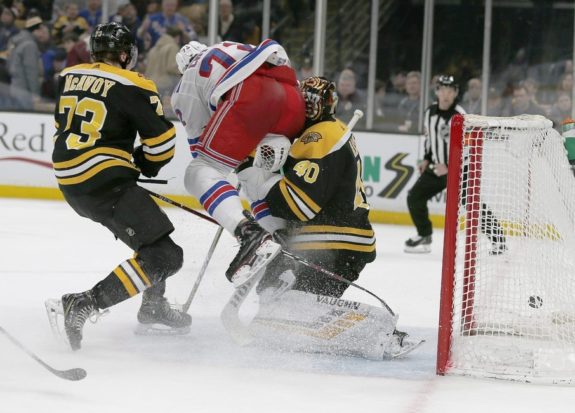
In the 16 games since, however, Chytil has recorded one goal. Quinn delivered his two-game period of “reflection,” and made clear that the kid needed to do more but never abandoned his nurturing, understanding ways.
Chytil’s development is crucial to his rebuilding team’s future, and how Quinn handles him at such a young age will likely prove critical in what he’ll become. His deft touch so far should have the front office thrilled.
“I thought he had a lot of jump and I certainly liked his approach to the game,” Quinn said of Chytil’s Sunday performance in a typically measured statement. There was no raving over the effort, no impatience or nitpicking. Just right.
No-Nonsense Approach with DeAngelo Paying Dividends
While Chytil is still finding his way with Quinn in his corner, the coach’s work with DeAngelo to this point has been even more impressive. Quinn has succeeded in getting through to a highly talented player with a questionable makeup whose career was at a crossroads going into this season, his third in the NHL.
The 19th-overall pick in the 2014 Draft lasted one season with the Arizona Coyotes before coming to the Rangers in the Derek Stepan trade, but he wasn’t any more effective under Alain Vigneault last season, posting a minus-18 rating, no goals and eight assists in 32 games.
Quinn has applied a less forgiving touch than he has with Chytil. DeAngelo plays with an edge, hardly a negative in hockey. The priority for him, like so many other fiery players, is controlling and applying that edge correctly, which Quinn can see is key to the defenseman’s development.
Quinn’s handling of the temperamental talent has allowed his tantalizing skills with the puck and skating ability to emerge on a more regular basis, perhaps for the first time in DeAngelo’s career. Of course, it’s impossible to know if the player with the checkered past, who was suspended twice in the minors and could benefit by staying off Twitter, will be able to consistently harness his demons and emerge as a star.
In what might have seemed an abrupt move, Quinn benched DeAngelo for two games on Jan. 31 and Feb. 2 for what the coach described as a “maturity issue.” While employing his characteristic protectiveness, Quinn also clearly wanted to make a point without embarrassing DeAngelo, having apparently perceived that the player was on the verge of running into more problems.
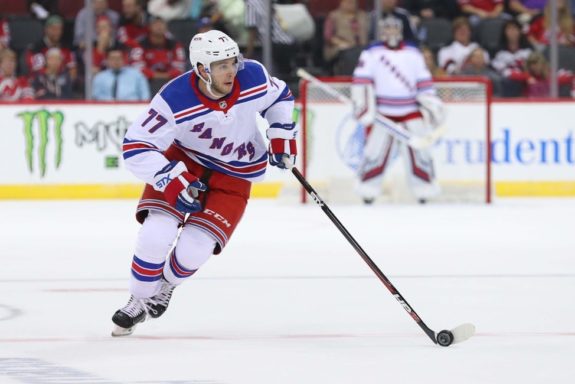
“He and I have talked about it and are working on it,” the coach said then. “He’s too good to let maturity issues get in the way of him becoming the kind of player he can be. It’s something he needs to work on and we need to help him with.”
The result? Reinstated for a home game against the Los Angeles Kings on Feb. 4, DeAngelo played a strong 17:49 and set up Chris Kreider for the first goal with a centering feed from the right corner. He finished with the one assist and a plus-two rating in the 4-3 overtime loss.
He followed that performance with the kind of effort that provided a glimpse of what the Rangers hope he will become night in and night out. Fiery and engaged but focused, DeAngelo was a force throughout the Blueshirts’ 4-3 comeback shootout victory over the Bruins on Feb. 6, delivering another assist and coming through with the winning goal in the tiebreaker on a beautiful deke and top-shelf shot.
Yapping with Bruins pest Brad Marchand throughout, DeAngelo gave it to Marchand one last time after that goal while skating past the bench, staring him down. It was the perfect amount of fire and control that Quinn is looking for and that DeAngelo needs to be successful.
The inconsistency is still there. DeAngelo was a minus-one in each of the next three games, then bounced back forcefully by posting a plus-four mark in a 6-2 victory over the Buffalo Sabres on Feb. 15, a game in which he knocked out and concussed Kyle Okposo with one punch during a fight. There have been more ups and downs since, but Quinn has stuck with him, giving him more responsibility and playing him for 26:32 in a 4-3 overtime loss to the NHL-best Tampa Bay Lightning on Feb. 27 and 23:04 in a 4-2 defeat to the Montreal Canadiens last Friday.
Quinn’s Coaching Range has Young Rangers Responding
Quinn’s approach with DeAngelo, more direct and blunt than with Chytil, has for the most part worked. Enough with nonsense, get a handle on your temper and focus on your responsibilities on the ice. Use your emotion, but don’t let it overwhelm you. Scratched a team-high 19 times this season, DeAngelo understands why.
“We have had good talks. I know exactly what (Quinn) thinks of me, expects of me, and what he believes my career can become,” said DeAngelo, who has recorded four goals, 21 assists and a plus-three rating in 48 games. “He explained that he’s trying to do what’s best for me over the long haul. We did talk about the big picture and what he wants for me as a player.”
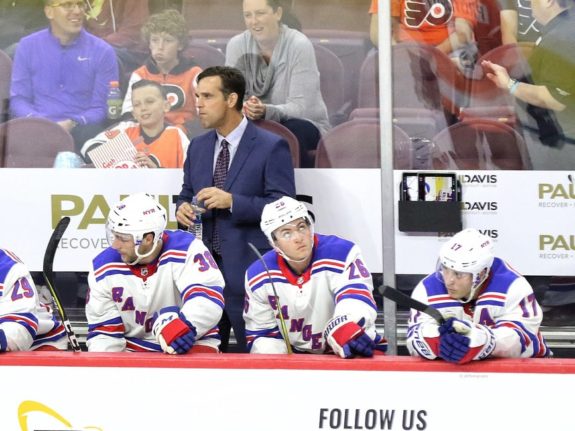
“It’s an emotional game, I’m a competitor and sometimes I can lose control a little bit, but I’m working on it,” DeAngelo said. “But I have to say that I’m much better now than I was in the past. I’ve got people helping me with it, but I’m also working on helping myself. I want to be able to stay on the ice.”
With Quinn’s guidance, that has been the case, at least so far.
The coach’s magic touch has shown up throughout the roster. He recognized the potential of November acquisition Ryan Strome and elevated him to the second-line center spot, getting rewarded with strong play from the fifth-overall pick in the 2011 Draft. Quinn has been characteristically patient with young center Brett Howden, who unexpectedly made the team out of training camp and started the season strong before suffering a typical rookie slump. He also missed all of February with an injury.
It’s the varied approaches with Chytil and DeAngelo, however, that have best illustrated the first-year NHL coach’s range in being able to get through to players. Win or lose each night in this rebuilding season, management should be ecstatic about their choice to lead the franchise through this uncertain but critical period.